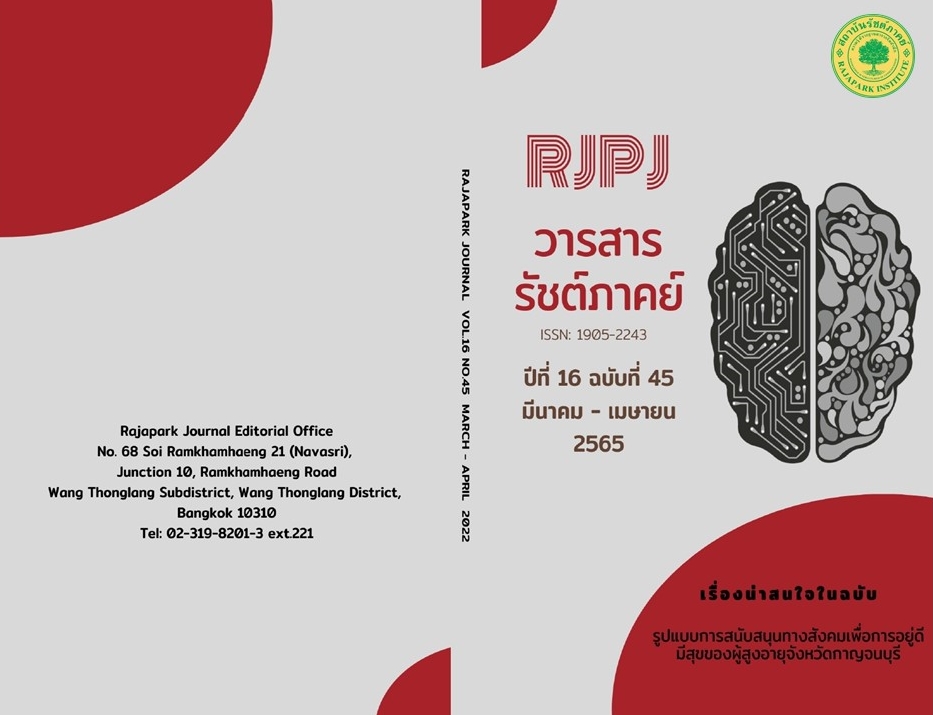People’s Participation in Environment Management of Suan Luang District Office Bangkok Metropolis
Main Article Content
Abstract
The objectives of this research were to 1) study the level of people’s participation in the environmental management of the Suan Luang District Office; 2) compare their participation classified by personal factors; and 3) study problems, obstacles, and recommendations for people's participation in environmental management. 123,609 people living in Suan Luang District were the target population, and 400 of them were selected as the study samples by means of a simple random sampling technique. Questionnaires with a confidence value of 0.87 were used for collecting data. Frequency, percentage, mean, and standard deviation were used for data analysis. The results of this research were as follows: The overall people’s participation in the environmental management of Suan Luang District Office was at a moderate level ( = 3.27). Accordingly, in terms of each aspect of their participation, according to the means ranked from the highest to the lowest were decision making, operation, and benefit assessment respectively. There were no significant differences among the opinions of people with different average monthly incomes and lengths of living in the community, whereas there were significant differences at 0.05 among the opinions of those with different genders, ages, education levels, and careers.
Article Details

This work is licensed under a Creative Commons Attribution-NonCommercial-NoDerivatives 4.0 International License.
Views and opinions appearing in the Journal it is the responsibility of the author of the article, and does not constitute the view and responsibility of the editorial team.
References
Arunwuthiwong, S. (1998). Factors Affecting People's Participation in Business Projects for Rural Development(Master’s Thesis). Kasetsart University.
Best, J. W. (1987). Research Education. New Delhi: Prentice-Hall.
Cohen, J. M., & Uphoff, N. T. (1980). Participations Place in Rural Development: Seeking Clarity Through Specificity. New York: World Developments.
Constitution of the Kingdom of Thailand, B.E. 2560 (2017, April 6). Government Gazette. Book 134. Chapter 40g, pp.1-90.
Department Environmental Quality Promotion. (1992). The Enhancement and Conservation of National Environmental Quality Act, B.E. 1992 and Related Laws. Bangkok: Department of Environmental Quality Promotion. Ministry of Science and Technology.
Gulick, L., & Urwick, L. (1937). Paper on the Science of Administration. Clifton: Augustus M. Kelley.
Khudkeaw, E. (2006). Community Participation in Environmental Management of Ban San Sai Phatthana in Chiang Mai Province(Independent Study). Chiang Mai University.
Office Suan Luang District. (2020). Registration Department Annual Performance Report 2020. No. 104. Bangkok: Prawet District Office Ministry of Interior.
Office of the National Economic and Social Development. (2017). Twelfth National Economic and Social Development Plan 2017 – 2021. Retrieved from https://www.nesdc.go.th/ewt_dl_link.php?nid=6422
Phoboon, C. (2007). Community Participation in Natural Resource Management and Environment. Journal of Environmental Management, 3(1), 1-34.
Ritcharoon, P. (2012). Research in Educational Administration to Improve the Quality of Education. College of Teacher Training: Phranakhon Rajabhat University.
Yamane, T. (1973). Statistics: An Introductory Analysis (2nd ed.). New York: Harper & Row.


